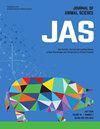Effects of extruded corn distillers dried grains with solubles (DDGS) on growth performance, nutrient digestibility, gut health, and microbiota diversity in weaned piglets.
IF 2.7
2区 农林科学
Q1 AGRICULTURE, DAIRY & ANIMAL SCIENCE
引用次数: 0
Abstract
This study was conducted to investigate the effects of extruded distillers dried grains with solubles (DDGS) on growth performance, nutrient digestibility, gut health, and gut microbiota in weaned piglets. A total of 144 piglets (Duroc×Landrace×Yorkshire, initial body weight 6.60 ± 0.35 kg) were randomly assigned to three treatments based on body weight (BW). The control group was fed a basal diet, while the experimental groups were fed diets supplemented with 8% and 16% extruded corn DDGS for 28 days. The results showed that feeding diets containing extruded corn DDGS had no significant impact on piglet growth performance (P > 0.05). There were no significant differences in the apparent total tract digestibility (ATTD) of GE, DM, OM, and CP between the 8% extruded corn DDGS group and the control group (P > 0.05). However, 16% DDGS supplementation reduced the digestibility of these nutrients (P < 0.05). Both the 8% and 16% extruded corn DDGS groups increased the ATTD of EE (P < 0.05). Furthermore, the 8% extruded corn DDGS group increased the malondialdehyde (MDA) content and superoxide dismutase (SOD) activity in the liver and jejunum, as well as upregulated total antioxidant capacity (T-AOC) activity and the levels of immune factors such as IL-1β, IL-6, IL-10, and TNF-α in the jejunum (P < 0.05). The expression of tight junction-associated proteins, such as claudin-1, occludin, and ZO-1, was also upregulated in this group (P < 0.05). The 16% DDGS supplementation had no significant effect on these indicators, but it reduced the villus-to-crypt ratio in the jejunum (P < 0.05). Additionally, the inclusion of extruded corn DDGS increased the diversity of microorganisms in colonic digesta, significantly reducing the relative abundance of Lactobacillus and Sharpea, while promoting the enrichment of Turicibacter, norank_f_Erysipelotrichae, unclassified_f_Lachnospiraceae, Ruminococcus, and Marvinbryantia (P < 0.05). Taken together, these results indicate that extruded corn DDGS have no adverse effects on growth performance. The addition of 8% extruded corn DDGS can enhance jejunal immunity and barrier function, increase intestinal microbial diversity, and improve EE digestibility by modulating the structure and composition of the gut microbiota. Therefore, extruded corn DDGS could be considered as a feasible ingredient to replace corn and soybean meal in piglet diets, thereby reducing feed costs.膨化玉米酒糟干颗粒加可溶物(DDGS)对断奶仔猪生长性能、营养物质消化率、肠道健康和微生物群多样性的影响
本试验旨在研究膨化酒糟及可溶物(DDGS)对断奶仔猪生长性能、营养物质消化率、肠道健康和肠道微生物群的影响。试验选用144头仔猪(Duroc×Landrace×Yorkshire,初始体重6.60±0.35 kg),按体重(BW)随机分为3组。对照组饲喂基础饲粮,试验组分别饲喂在基础饲粮中添加8%和16%挤压玉米DDGS的饲粮,试验期28 d。结果表明,饲粮中添加膨化玉米DDGS对仔猪生长性能无显著影响(P < 0.05)。8%挤压玉米DDGS组GE、DM、OM和CP的表观全消化道消化率与对照组无显著差异(P < 0.05)。然而,添加16% DDGS降低了这些营养物质的消化率(P < 0.05)。8%和16%挤压玉米DDGS组均提高了粗脂肪的ATTD (P < 0.05)。8%挤压玉米DDGS组提高了肝脏和空肠丙二醛(MDA)含量和超氧化物歧化酶(SOD)活性,上调了空肠总抗氧化能力(T-AOC)活性和免疫因子IL-1β、IL-6、IL-10、TNF-α水平(P < 0.05)。claudin-1、occludin、ZO-1等紧密连接相关蛋白的表达也在实验组中上调(P < 0.05)。添加16% DDGS对这些指标无显著影响,但降低了空肠绒毛/隐窝比(P < 0.05)。此外,挤压玉米DDGS增加了结肠食糜微生物的多样性,显著降低了乳杆菌和Sharpea的相对丰度,促进了Turicibacter、norank_f_丹毒菌、unclassified_f_Lachnospiraceae、Ruminococcus和Marvinbryantia的富集(P < 0.05)。综上所述,挤压DDGS对玉米生长性能无不良影响。添加8%膨化玉米DDGS可通过调节肠道菌群结构和组成,增强空肠免疫力和屏障功能,增加肠道微生物多样性,提高粗脂肪消化率。因此,挤压玉米DDGS可作为仔猪饲粮中替代玉米和豆粕的可行原料,从而降低饲料成本。
本文章由计算机程序翻译,如有差异,请以英文原文为准。
求助全文
约1分钟内获得全文
求助全文
来源期刊

Journal of animal science
农林科学-奶制品与动物科学
CiteScore
4.80
自引率
12.10%
发文量
1589
审稿时长
3 months
期刊介绍:
The Journal of Animal Science (JAS) is the premier journal for animal science and serves as the leading source of new knowledge and perspective in this area. JAS publishes more than 500 fully reviewed research articles, invited reviews, technical notes, and letters to the editor each year.
Articles published in JAS encompass a broad range of research topics in animal production and fundamental aspects of genetics, nutrition, physiology, and preparation and utilization of animal products. Articles typically report research with beef cattle, companion animals, goats, horses, pigs, and sheep; however, studies involving other farm animals, aquatic and wildlife species, and laboratory animal species that address fundamental questions related to livestock and companion animal biology will be considered for publication.
 求助内容:
求助内容: 应助结果提醒方式:
应助结果提醒方式:


